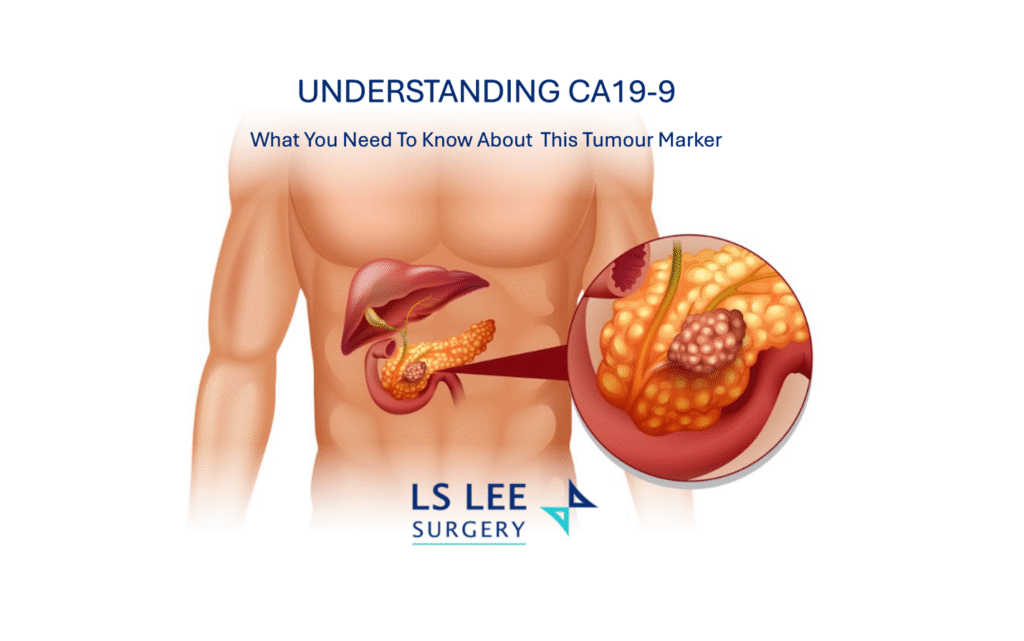Learn How CA 19-9 Helps Monitor Pancreatic and Biliary Cancers — And What It Can (and Cannot) Tell You
Introduction
As medical science evolves, tumor markers like CA 19-9 (Carbohydrate Antigen 19-9) have become increasingly relevant in the early detection, monitoring, and management of certain cancers — especially pancreatic and bile duct cancers. In this article, we provide a clear overview of CA 19-9, including how it works, when it’s used, what elevated results might mean, and its limitations.
What Is CA 19-9?
CA 19-9 is a tumor marker — a substance found in higher-than-normal levels in the blood of some patients with cancer. It is:
- Most often elevated in pancreatic cancer and cholangiocarcinoma (bile duct cancer)
- Sometimes raised in stomach and colorectal cancers
- Also elevated in non-cancerous conditions such as:
- Pancreatitis
- Gallstones or bile duct obstruction
- Jaundice
- Pancreatic cysts
Important: Some healthy individuals may also show mild elevations (false positives), and approximately 5–10% of people genetically lack the Lewis antigen — meaning they don’t produce CA 19-9 at all, even if they have cancer.
When Is CA 19-9 Testing Used?
CA 19-9 blood tests are not used as a stand-alone screening tool but are useful in the following scenarios:
1. Monitoring Treatment Response
- Helps track how well pancreatic or bile duct cancer treatments are working.
- Falling levels usually mean good response to chemotherapy, surgery, or radiation.
2. Detecting Recurrence
- After treatment, periodic testing may help detect cancer recurrence early.
3. Cancer Screening (With Caution – )
- Sometimes included in routine panels, especially in high-risk individuals.
- Must be followed by imaging (CT, MRI) or endoscopy if elevated.
Interpreting Elevated CA 19-9 Levels
Most labs consider values under 37 U/mL to be normal, but reference ranges may vary.
What Elevated Levels Could Mean:
- Rising levels: Possible cancer progression or recurrence
- Falling levels: Positive response to treatment
- Mildly elevated in healthy people: May not indicate cancer — further testing needed
Red flags that may prompt urgent evaluation include: – Unexplained weight loss – Loss of appetite – Jaundice (yellowing of skin/eyes) – Upper abdominal pain or lump
These symptoms, along with significantly elevated CA 19-9, warrant immediate diagnostic imaging.
CA 19-9 and Pancreatic Cancer: A Critical Tool
Pancreatic cancer is the 4th leading cause of cancer deaths in Singapore. Unfortunately, only 15–20% of patients are eligible for surgery at diagnosis due to late detection.
- CA 19-9 is not diagnostic on its own, but it assists in:
- Monitoring tumor growth
- Planning treatments
- Guiding follow-up care after surgery or chemotherapy
Limitations of CA 19-9 Testing
While CA 19-9 is useful, it has significant limitations: – Not all pancreatic cancers produce CA 19-9 – Benign conditions (e.g., gallstones, inflammation) can falsely raise levels – Genetic factors (Lewis antigen status) can cause false negatives
As a result, elevated levels can lead to unnecessary anxiety if not interpreted properly. Always consult a doctor before drawing conclusions.
What Should You Do If Your CA 19-9 Is High?
- Don’t panic — test results are only part of the picture
- Your doctor will correlate CA 19-9 with:
- Symptoms
- Imaging scans
- Endoscopic or biopsy findings
- Further testing may include CT, MRI, or even PET scans.
Speak With a Specialist
If you’ve received an abnormal CA 19-9 result or have concerns about pancreatic health, consult an experienced surgeon. You can contact Dr. Lee Lip Seng, a senior pancreas surgeon in Singapore, at +65 6550 2317 to schedule an appointment or discuss next steps.
Final Thoughts
CA 19-9 is a valuable marker when used appropriately — especially in tracking pancreatic cancer treatment or recurrence. But remember: – It’s not a diagnosis – It’s not for general screening – It must be interpreted alongside other clinical data
Disclaimer: This article is intended for general informational purposes only and should not replace professional medical advice, diagnosis, or treatment. Please consult a licensed healthcare provider for personalized care.







